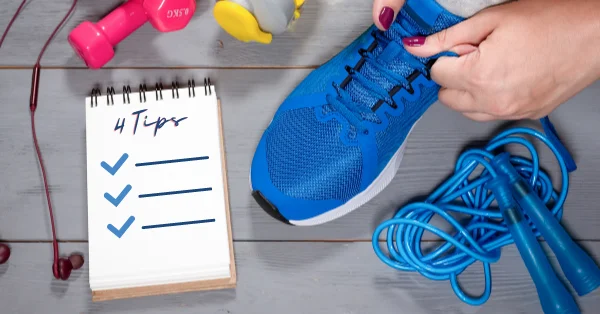As a clinical social worker living with type 1 diabetes, I can attest firsthand to the toll stress can take on a person. I teach coping skills and coach on ways to regulate emotions. However, this hasn’t spared me from moments of sitting on the floor in a pool of tears during a hypoglycemic episode, aggressively ripping skins off clementines to hurl them across the room, while simultaneously sucking out the juice through gasps of hyperventilation.
Yes, even high-functioning, reasonably well-adjusted adults who know how to manage stress are not immune to it.
Stress is our body’s way of responding to threat or danger. When we sense danger – whether real or imagined – our body releases stress hormones called epinephrine (aka adrenaline) and cortisol. This triggers a fight-or-flight reaction, which we often call the “stress response.”
Chronic stress disrupts nearly every system in our bodies. It can suppress the immune system, upset our digestive and reproductive systems, increase the risk of heart attack and stroke, and speed up the aging process. It can even rewire the brain, leaving us more vulnerable to anxiety, depression, and other mental health issues. Too much stress can lead to serious health problems, especially for those of us already living with chronic conditions like diabetes.
Stress gets a bad rap, but the truth is we need it to survive. When working properly, stress can help us stay focused, energized, and alert. In emergency situations (ie. seeing double down arrows on our continuous glucose monitors (cgms)), stress can save our lives. It tells the body to move and take action.
The key is knowing how to regulate stress and tolerate its discomforts. Below are 10 stress management techniques, divided into sections of Prevention and Diabetes Distress:
Prevention
The first step to managing stress is prevention. If at any point in the prevention stage you feel stress is building, keep yourself in check and start ramping up these strategies!
- Know your stressors and reactions. First thing’s first. Everyone responds to stress differently, so it’s important to learn your common stressors and how you react to them. If you don’t know what stresses you out, or how you typically respond to stress, keep a daily journal to help you identify patterns. These patterns will help you be more prepared when stressors arrive.
- Live mindfully. Mindfulness means being fully present in any particular moment without distraction or judgment. It involves being aware of our thoughts and feelings without getting caught up in them. Mindfulness doesn’t eliminate stress or other difficulties, but it does allow us more opportunity to manage unpleasant thoughts and emotions.
- Practice self care. Self care doesn’t always mean reading on a beach or taking bubble baths. It means deliberately and intentionally doing something in order to take care of our mental, emotional, and physical health. It’s a simple concept that often gets overlooked. Good self care is key to improved mood and reduced stress. It also promotes healthy relationships with ourselves and others. Simply put, listen to your body and give it what it needs – always!
- Exercise boundaries. I cannot emphasize enough how important boundaries are when managing a health condition. We have to know how to set limits in order to keep our blood sugars, stress, daily responsibilities (health-related and otherwise), and other symptoms as manageable as possible. Boundaries come in all shapes and sizes. By being selective about what you take on, you are taking control over parts of your life that you can change, which will ultimately reduce your stress levels over time.
- Move and sleep. These are two more biggies. Both sleep and exercise help to combat the negative effects of stress on our bodies, making it good for both our physical and mental health. Physical activities release endorphins (our body’s natural painkillers), which helps improve mood and lower symptoms of stress and anxiety. It also helps to improve the quality of sleep, which can be a challenge while managing blood sugars. Control what you can to maintain good sleep hygiene, such as maintaining a consistent sleep routine, avoiding screens before bed, and resting in a disruption-free environment.
Diabetes Distress
This is what I’d call a crisis zone. Stress has not been prevented and emotions have taken over. We want to rip out our insulin pumps, muffle our cgm alarms, and get rid of diabetes altogether.
- Radical Acceptance. Radical acceptance simply means that you’re choosing to acknowledge reality rather than fight it. Radical acceptance is not approval, but rather completely and totally accepting that we cannot change the facts of reality, even if we don’t like them. By choosing to radically accept things that are out of our control, we prevent ourselves from being stuck in unpleasant emotions and prevent suffering. An example: recognizing you cannot always have perfect diabetes management.
- Engage with a support system. This is recommended always (not just during times of distress), but reaching out to support in times of crisis is especially important. Talk to your loved ones, coworkers, and treatment team about ways you’re trying to reduce the amount of stress in your life. It’s important to be open to help. If you don’t have close family or friends, get involved in a support group, either online or in person. One awesome thing about diabetes is the amazing community that comes along with it!
- Use the “Stop” Skill. This is a skill worth implementing in those moments when you’re on the verge of throwing your insulin pump (or in my case, clementines, across the room). When your emotions start to feel out of control, stop! Don’t react. Freezing for a moment helps prevent you from doing what your emotions want you to do (which is to act without thinking). Stay in control. Remember, you are the boss of your emotions. Now name the emotion – put a label on it.
- Deep breathing. Yea, yea, this is listed on every single stress and anxiety blog EVER. It is – because it’s important! Stress activates our sympathetic nervous systems, signaling our bodies into that fight-flight mode. When stress hormones are released, we experience physical reactions like increased heartbeat and faster breathing. By focusing on our breath, we activate our parasympathetic nervous systems, which slows our heart rate and controls the relaxation response. Basically, stress revs our bodies up, and controlling our breath slows things back down. Regardless of what deep breathing exercise you try, the goal is to focus on your breath, making it slower and deeper.
- Distraction. Distraction does not help us solve our problems (ie. it’s not going to make our diabetes go away), but it can distract us from a crisis without making matters worse. In moments of distress, leave the situation mentally. Build an imaginary wall between yourself and the situation, or focus your attention on something you need to get done. Examples of distractions include watching TV, listening to music, going for a walk, cooking dinner or calling a friend.
Keep your stress levels managed and skills in your pocket for times when distress occurs. The better you get at managing your stress, the better you’ll feel – and fewer clementines will be injured along the way.

Sara Maurer, LCSW
Sara is a Licensed Clinical Social Worker (LCSW) living with Type 1 Diabetes and multiple other autoimmune-related symptoms. She was diagnosed with Type 1 while living in New York City in 2016, three weeks after her 32nd birthday. It didn’t take long for Sara to identify two major gaps in the world of diabetes management: the limited resources available for managing the mental health components of diabetes, and the need for more support of those diagnosed with adult-onset Type 1. Sara has spent most of her adult life working in the nonprofit sector in various cities around the U.S. and abroad. She has many interests within the mental health field, though her passions lie in treating trauma, emotional sensitivities, and unhealthy behavior patterns. Since her diagnosis, Sara has also dedicated part of her career and practice to coaching, educating and advocating for those affected by diabetes. She currently works as a clinical therapist in her hometown of Rochester, New York and provides online diabetes health coaching to clients worldwide.









